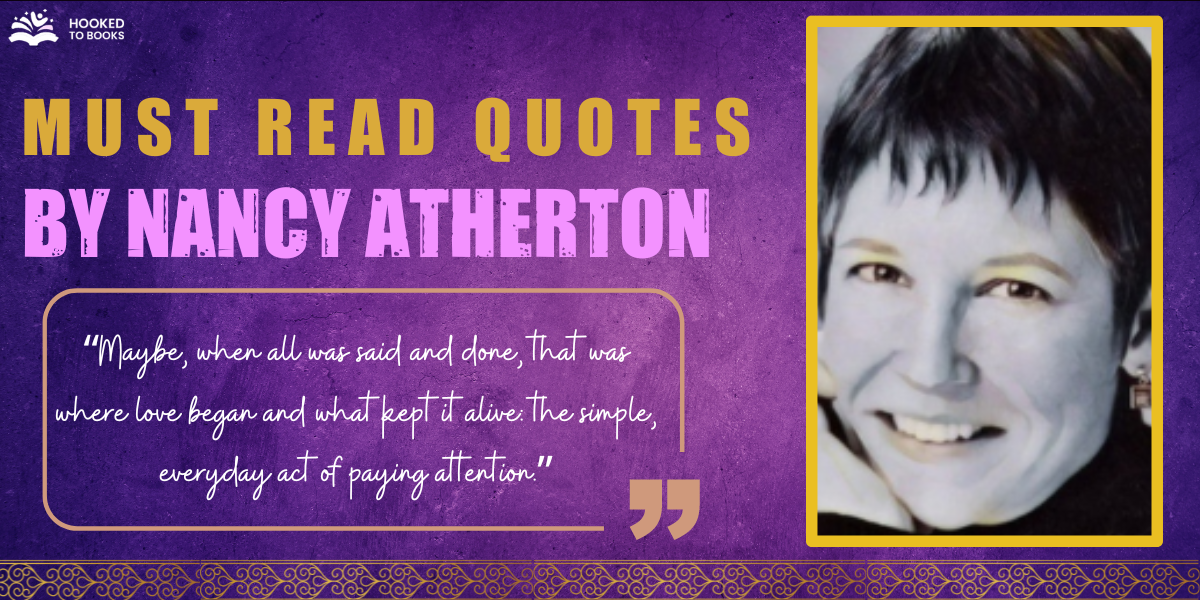Nancy Atherton is a famous American author who writes mystery novels. Her series called Aunt Dimity is popular among readers. When it comes to quotes, you can find many meaningful, inspiring, and sweet ones in her books.
In this article, I have compiled 12 best Nancy Atherton quotes and also added their meanings. If you are looking for some inspiring and influential quotes, you may find them here.
Check out this article for some beautiful quotes!
12 Nancy Atherton Quotes and Their Meanings
Below listed are the 12 best Nancy Atherton quotes; have a look!
“Helplessness in the face of a child’s suffering is the curse of parenthood.”
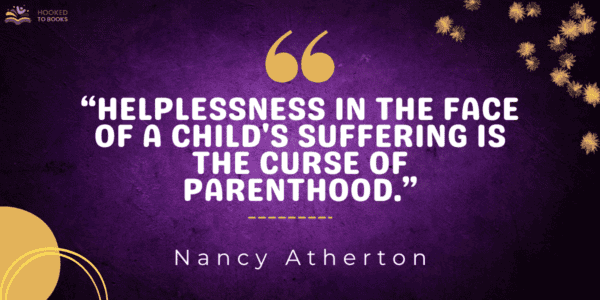
The quote expresses the profound feeling of being unable to protect or ease the pain of one’s own child. It conveys that parents often feel distraught when their child is going through a difficult time and wish they could do more to make things better.
It highlights the emotional bond between parents and their children and the instinct to shield them from harm. It reminds us that parenthood comes with the challenge of witnessing our children’s struggles and wishing we could spare them from any suffering.
“Maybe, when all was said and done, that was where love began and what kept it alive: the simple, everyday act of paying attention.”
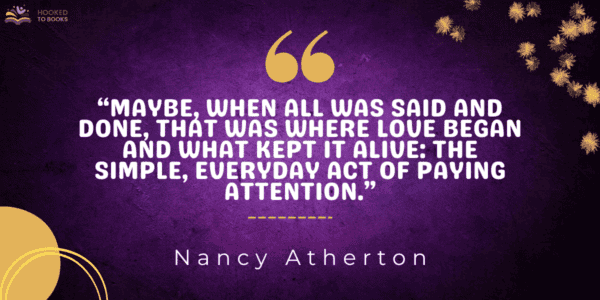
Love thrives when we pay attention to the little things in our relationships. It emphasizes that love isn’t just about grand gestures but also about noticing and caring for the small details of our loved ones’ lives. We nurture and sustain our love by being attentive to their needs, feelings, and experiences in everyday moments.
It implies that love grows through the continuous effort of being present and considerate towards our partners or loved ones. The quote highlights the significance of mindfulness and care in maintaining and kindling the flame of love.
“A woman without a past is like a fruitcake without brandy-insipid!”
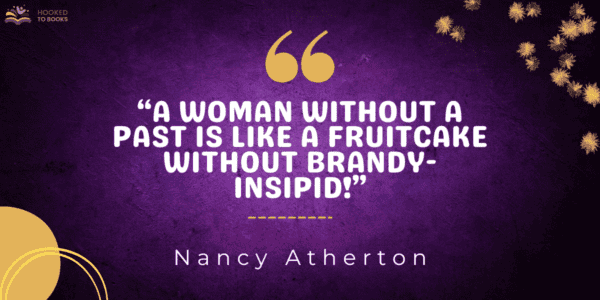
This quote compares a woman without a past to a fruitcake without brandy, suggesting that a person’s life experiences and history add depth and flavor to their character.
Just as brandy enhances the taste of a fruitcake, one’s past experiences shape one’s personality and make them more interesting.
It emphasizes that having a history, with its ups and downs, makes a person more vibrant and compelling. It highlights the idea that our past, with its lessons and stories, is what gives us substance and makes us unique individuals.
It encourages us to embrace our life journey as it enriches our identity.
“A decent world is built upon small acts of kindness.”
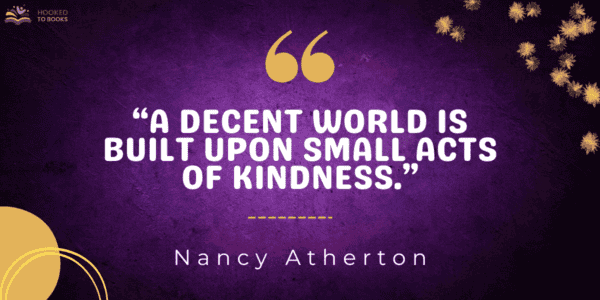
A better and more compassionate world is created when people engage in simple acts of kindness towards one another. It emphasizes that the foundation of a good society is not grand gestures or extraordinary deeds but rather the everyday small acts of goodness and consideration.
These acts include helping someone in need, offering a friendly smile, or showing empathy and understanding. The quote reminds us that even the smallest gestures of kindness can significantly and positively impact the world, fostering a sense of unity, empathy, and goodwill among people.
“God’s heart is big enough to hold people of all faiths and races.”
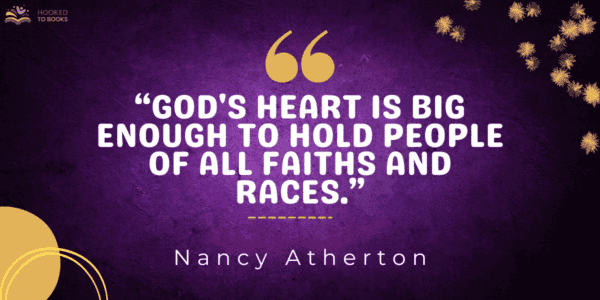
Love and acceptance of a divine being symbolized as “God’s heart,” is vast and inclusive. It suggests that regardless of one’s faith or racial background, there is a place for everyone to embrace this universal love.
It promotes the notion of unity and equality among people, emphasizing that God’s love transcends religious and racial boundaries.
In essence, the quote encourages us to recognize the common humanity in all individuals, fostering a sense of harmony, tolerance, and respect among diverse cultures and beliefs, ultimately promoting a world where everyone is valued and cherished.
“It was a small thing, perhaps, but great changes begin with small things.”
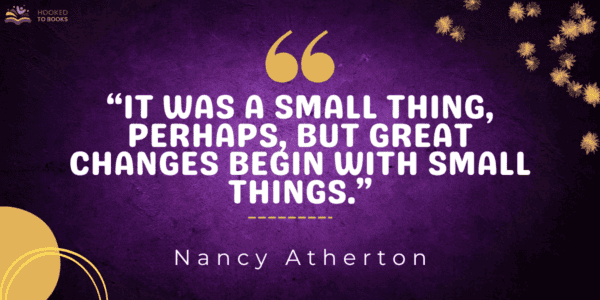
Though something may seem unimportant or tiny, it has the potential to spark significant transformations. It underlines the idea that major life changes often have humble beginnings.
Just as a small spark can ignite a big fire, small actions, decisions, or events can lead to important shifts and improvements.
It encourages us to appreciate the importance of taking small steps towards our goals or making small gestures of kindness because they can accumulate and set the stage for bigger, more meaningful changes in our lives and the world around us.
“Recognize your limitations and rejoice in them!”
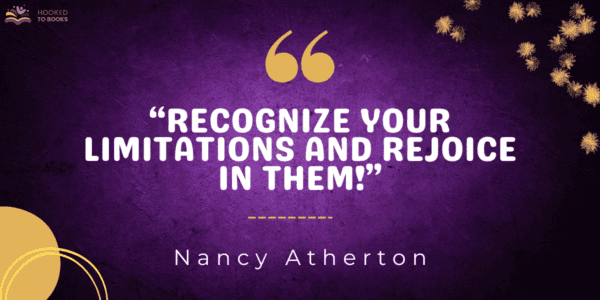
This quote advises us to acknowledge our weaknesses and shortcomings without feeling disheartened. Instead of being discouraged by our limitations, it encourages us to find contentment and joy in them.
By recognizing and accepting our boundaries, we can focus on our strengths and what we can do well. It reminds us that each person has a unique set of abilities and constraints, and by embracing these limitations, we can lead more fulfilling lives.
Ultimately, this quote suggests that self-acceptance and a positive attitude toward our limitations can lead to a happier and more balanced existence.
“When his dream proved to be more than he could handle, he didn’t become discouraged. He simply recognized his limitations and decided to live happily within them.”
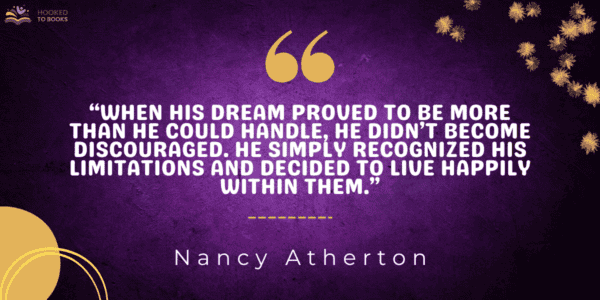
It tells the story of someone who didn’t give up or feel discouraged when faced with a dream or goal that turned out to be too challenging. Instead, they chose to acknowledge their limitations and adjust their ambitions accordingly.
Rather than pursuing something beyond their capabilities, they found contentment and happiness in accepting what they could realistically achieve.
This quote highlights the importance of self-awareness and resilience. It teaches us that it’s okay to reassess and adapt our goals to our abilities, ultimately leading to a more satisfying and balanced life.
“He refuses to let bitterness poison his heart. He chooses instead to believe in the healing power of love.”
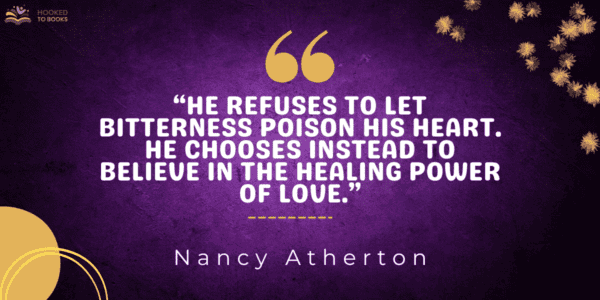
The quote portrays a person who opts not to harbor bitterness or resentment in their heart despite facing difficult or hurtful circumstances. Instead, they consciously choose to have faith in the ability of love to mend wounds and bring about positive change.
It underscores the idea that holding onto bitterness only perpetuates pain while embracing love and forgiveness can lead to emotional healing and personal growth.
In essence, it encourages us to let go of negative emotions and open ourselves to the transformative and uplifting influence of love, fostering a more compassionate and hopeful outlook on life.
“It’s pointless to defeat evil by destroying life.”
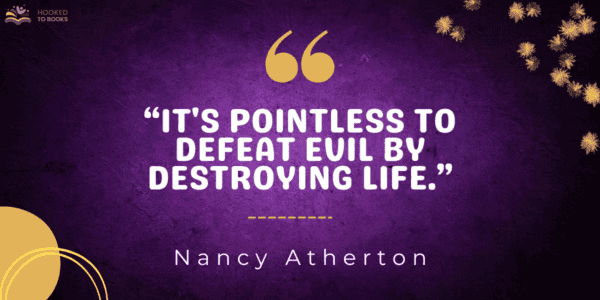
Trying to combat wrongdoing or evil by causing harm or taking lives is futile. It suggests that violence or destruction as a means to defeat evil often perpetuates a cycle of hatred and suffering.
Instead, people should adopt a more compassionate and peaceful approach to addressing negative forces. It implies that by preserving life and seeking alternatives like understanding, empathy, and reconciliation, we have a better chance of truly overcoming evil and creating a more harmonious world.
In essence, the quote encourages us to choose non-destructive methods to counteract negativity and promote goodness.
“They were tales of commonplace courage and optimism, for I knew from my own experience that everyday virtues endure best, and that quiet courage is worth more than the grandest derring-do.”
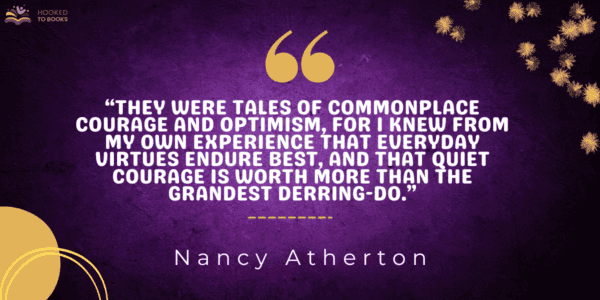
It tells us about stories that celebrate ordinary acts of bravery and hope. Based on the speaker’s personal understanding, everyday virtues like kindness, resilience, and optimism are the most enduring.
These small, quiet acts of courage and determination hold greater value than bold and adventurous feats. The quote emphasizes the significance of the strength found in everyday life, as it is often in the face of everyday challenges that people display their true character.
It encourages us to appreciate and take inspiration from the simple yet powerful acts of courage and positivity that surround us daily.
“You cannot warm yourself at the fire of anger without chilling your soul.”
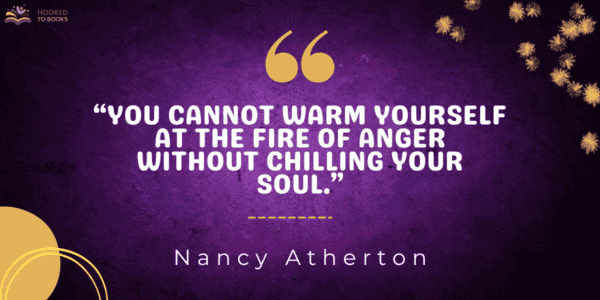
Indulging in anger may provide temporary satisfaction but ultimately harms our inner well-being. It suggests that anger, like a fiery blaze, might offer warmth, but it has a chilling effect on our soul, symbolizing our inner peace and harmony.
Holding onto anger can lead to bitterness and emotional coldness, damaging our own mental and emotional state.
The quote advises us to be cautious with anger, as it can have detrimental long-term effects on our inner serenity, and it encourages us to seek healthier ways to address conflicts and negative emotions.
Wind-Up
Highlighting quotes from books is the favorite thing for many readers. Authors amaze us with their deep meanings through multiple phrases. Few beautiful quotes even remain with us for a long time.
I hope this article on 12 Nancy Atherton quotes was helpful to you.
Which quote did you resonate with the most? Share your views in the comments!



